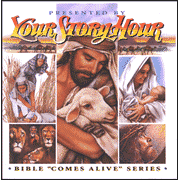| From CBD Bible Comes Alive, Volume 1 Your Story Hour, CD By Your Story Hour These wonderful, fully dramatized recordings bring the Bible to life by realistically portraying your favorite Old and New Testament stories. Designed for use by families of all Christian faiths, these recordings are non-doctrinal and inter-faith in nature. Complete with sound effects and music. Enacted by a professional cast. Exciting, educational, and entertaining. 24 stories including: Adam and Eve; Cain and Abel; The Man who Believed What God Said Part 1 & 2; The Temple Tower; The Call of Abraham; The Three Strangers; Sodom; The Supreme Test; A Strange Romance; The Unlike Twins; The Cheating Twin-Cheated; The Mystery of the Disappearing Idols; The Case of the Wrestling Twin; The Coat of Many Colors; Mrs. Potiphar and the Dungeon; The King's Butler and the King's Baker; The King and the Slave; The Unreasonable Prime Minister; The Governor's Mysterious Feast; The Long Delayed Reunion; A Deliverer Is Born; Moses Fulfills His Destiny; The King with the Heart of Stone; Miracles by the Sea. 12 CDs. |
Cain and Abel
Genesis 4 Review Activities for this Lesson
In Old Testament times, God commanded people to worship Him with burnt offerings. These offerings were burned on altars. They were called sacrifices. Do you remember how God let the people know what He wanted them to do? The Bible had not been written then, so they could not read to find out like we do. He talked with the fathers in each family. They were called patriarchs. Their time was called the Patriarchal Age. If you knew how God wanted you to worship Him, would you try to please Him? There was a problem when Cain and Abel offered their sacrifice. We will talk about that problem this week.
Adam and Eve lost their wonderful home because they did not obey God. They ate the fruit from which God told them not to eat. God put them out of the garden because of this sin. We sometimes get punished immediately when we disobey God. Sometimes we are punished later. But we cannot do wrong without suffering for it.
Adam and Eve should have said, “Thank you, Father, for our lovely home.” They should have known He knew what was best for them since He made them. But they did not want to obey Him. They wanted to have their own way instead. God had to punish them, just as your parents have to punish you when you disobey them.
Adam and Eve’s problems did not end when they lost their home in the Garden of Eden. After their children were born there was more trouble. Their first son Cain was a farmer who worked in the fields. Their second son Abel was a shepherd and took care of flocks and herds.
Both of the sons made a sacrifice to God, but God liked Abel’s sacrifice better. Abel had brought an animal for an offering, but Cain had brought plants.
Cain was jealous because God liked Abel’s sacrifice better than his. The Bible tells us, “…Cain was very angry and his countenance fell.” That means Cain even looked angry. God said to Cain, “Why are you angry? And why has your countenance fallen? If you do well, will you not be accepted? But if you do not well, Sin lies at the door.” God was warning Cain to calm down. But Cain would not.
Later when they were alone out in the field, Cain killed his brother Abel. Then he buried his body in the ground. Wasn’t that a terrible thing for him to do? Of course God saw what happened. He asked Cain about Abel, saying “Where is Abel your brother?”
But Cain did not want to tell God what had happened.
He said, “I do not know… am I my brother’s keeper?”
Do you understand what Cain did? First he killed his brother, then he lied about it. He sinned when he took his brother’s life and sinned again when he pretended not to know what happened to him.
Because of Cain’s sin God had to punish him. God said, “The voice of your brother’s blood cries to me from the ground.” This was God’s way of saying, “Cain, you are not getting by with your evil. I know that you have murdered your brother.
God told Cain that the ground would not grow plants for him as it had before he killed his brother. He would have no certain place to live - - he would be roaming from place to place.
Cain said, “My punishment is greater than I can bear…whoever finds me will kill me.” God felt sorry for Cain and told him He would put a mark on him to keep people from killing him. God also said He would punish anyone who tried to kill Cain.
We can see that disobeying God always brings trouble and unhappiness. But remember God’s laws always have a good side - - if we keep them we can be happy while we live on this earth. Then we can be with Him in heaven after this life.
TALKING IT OVER
1. God told his people how to worship Him in Old Testament
times. He tells us today, too. Do we still offer animals to Him? How do we
worship?
2. It’s very hard for some people to control their temper. What bad things
happen when people are angry?
3. Can angry words cause problems? Hurt other people?
MEMORY VERSE
“By faith Abel offered to God a more excellent sacrifice than Cain…” Hebrews 11:4
This verse tells us why Abel is famous today.
Credits
Text by Betty Belue Haynes, originally published in Bible Talk Times.
Used here with the kind permission of the author. Users are free to reproduce
for use, but not for publication.
